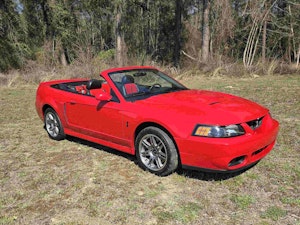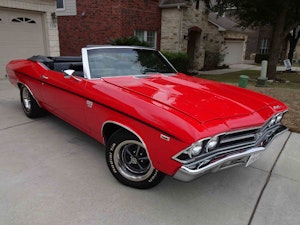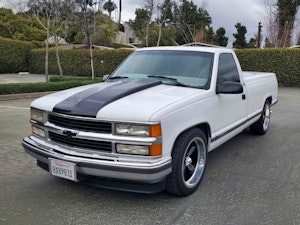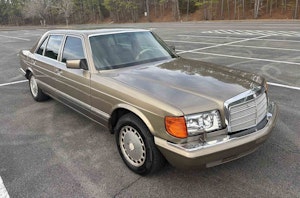Media | Articles
Apollo 12 astronaut’s Corvette, civil rights leader’s VW Type 2 take D.C. stage
Just a car, you say? Just a bus? No, not these two. Both are connected to events that shaped the future of America—and the world. In September they’ll appear on the National Mall in Washington, D.C., stars of the Historic Vehicle Association’s fifth annual Cars at the Capital exhibit.
Apollo 12 astronaut Alan Bean’s 1969 Chevrolet Corvette will be on display September 12–19, while the 1966 Volkswagen Deluxe Station Wagon formerly owned by Civil Rights activists Esau and Janie B. Jenkins will be shown September 20–26.
The vehicles will be displayed in a special glass enclosure on the walkway between the Smithsonian National Air & Space Museum and the National Gallery of Art.
The historically significant vehicles are being commemorated and recorded as part of the HVA’s National Historic Vehicle Register program.
“The automobile has left an indelible mark in our history and we believe America’s automotive heritage should never be lost nor forgotten,” says Diane Parker, vice president of the Historic Vehicle Association. “We’ve made it our mission to document and share America’s automotive heritage by telling the human-interest stories behind the horsepower and ensure their histories are captured in perpetuity.”
Marketplace
Buy and sell classics with confidence
In November 1969, Alan Bean became the fourth person to walk on the Moon, following in the footsteps of Apollo 12 teammate Pete Conrad and the first men to accomplish the feat, Apollo 11’s Neil Armstrong and Buzz Aldrin.


Bean took part in a special program that allowed astronauts to lease Chevrolet vehicles for $1 per year through Florida car dealer Jim Rathmann. Along with his Apollo 12 colleagues (including Command Module pilot Dick Gordon), Bean’s 1969 Corvette is gold and black and carries a red-white-blue plaque to commemorate the lunar mission. Of the three custom 390-horsepower, 427 Stingray coupes ordered by the Apollo 12 crew, only Bean’s survives.
HVA historian Casey Maxon calls it “one of the most culturally significant Corvettes in existence.”
The car won a Top Flight award at the 2002 National Corvette Restorers Society (NCRS) National Meet and the coveted Duntov Award of Excellence at the NCRS Nationals in 2002. The Corvette also won the 2008 NCRS American Heritage Award “for the preservation of a historically significant piece of Corvette history” at the NCRS Nationals, making it the only Corvette in history to win both Duntov and Heritage awards. To date, the car has just over 35,000 original miles on its odometer. Its current owner, Danny Reed, has owned the car for 48 years.
“It’s pure and simple Americana—a four-wheeled time capsule that represents quintessential 1960s history: the moon landing, astronauts, and big-block muscle cars,” Maxon says. “And it was specially designed by legendary Tucker stylist Alex Tremulis.”
The other vehicle on display in Washington, D.C., is also historically significant, but it tells a completely different story of triumph.
The 1966 Volkswagen Deluxe Station Wagon was originally owned by Esau and Janie B. Jenkins, Civil Rights pioneers who dedicated their lives to the people of Johns Island, South Carolina, and beyond.



“The microbus became a fixture in the South in the 1960s as the Jenkinses made major strides in their community to combat racial inequality, were successful entrepreneurs, and inspired numerous civil rights leaders, including Martin Luther King, Jr.,” Maxon says. “The microbus is in unrestored condition and is a testament to the unequaled work of a family that went above and beyond to change their community and the nation for the better.”
The back hatch of the bus, which now resides in the Smithsonian National Museum of African American History and Culture in Washington D.C., still wears a painted slogan that captures exactly what the Jenkins family was all about: “Love is Progress, Hate is Expensive.”
For more about the vehicles featured at Cars at the Capital, visit the HVA’s Facebook and Instagram pages.
***
The HVA is dedicated to preserving and sharing America’s automotive heritage. In 2014, The HVA established the National Historic Vehicle Register in partnership with the U.S. Department of the Interior, Heritage Documentation Programs and Library of Congress, respectively, to document historically significant automobiles in America’s past. The HVA is supported by over 400,000 individual historic vehicle owners, key stakeholders and corporations as well as individual benefactors.
The 2019 Cars at the Capital exhibition is underwritten in part through the generous support of Shell (including their Pennzoil and Quaker State brands), The NB Center for American Automotive Heritage and Hagerty, host to the largest network of collector car owners.










